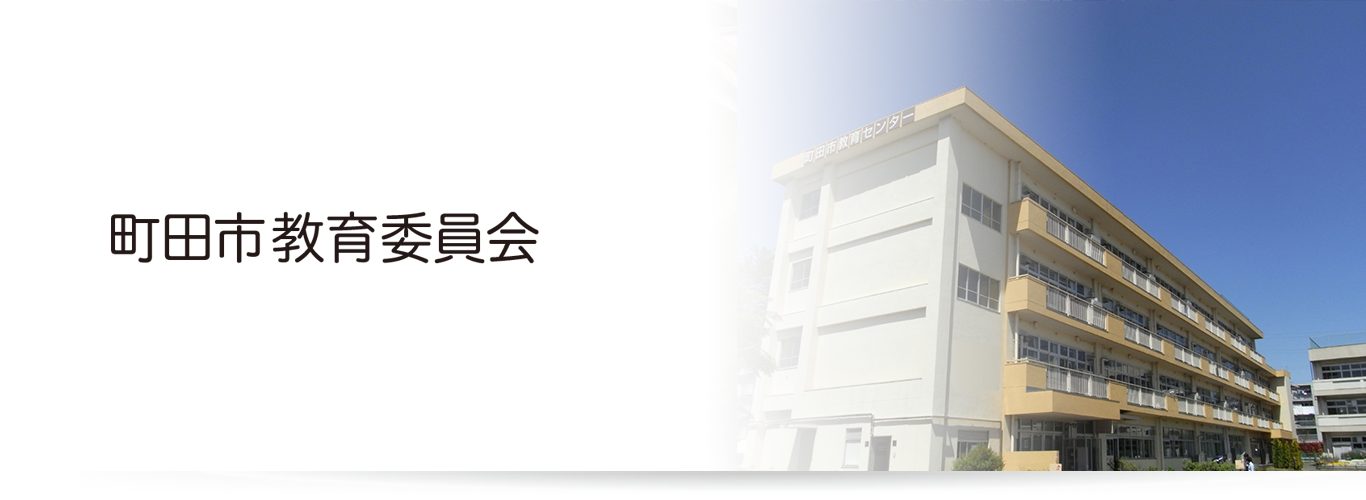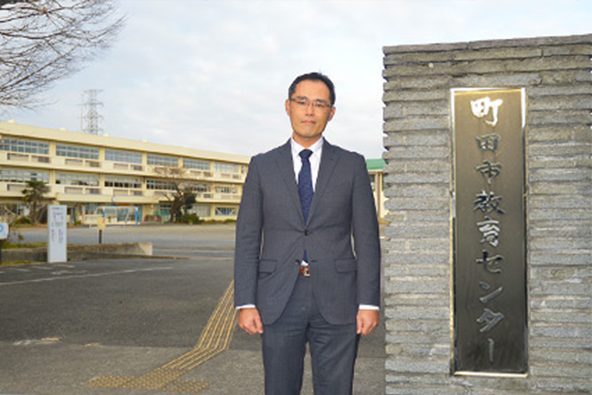

The Introduction of Chromebook and HENNGE One Has Actualized a Secure Access Environment to Google Workspace. We believe that this will contribute to safe and secure work usage by faculty and staff, and contribute to work style reform.
Efforts to expand the ICT environment in a 5-year plan to promote the digitalization of education
— Please tell us about Machida City’s efforts in the field of education.
Under the two main pillars, “digitalization of education” and “Machida’s unique English education”, the Machida City Board of Education aims to nurture “children who can learn independently and make their own decisions”. In promoting the digitalization of education, which is one of our most important projects, we are placing emphasis on the development of ICT environments in schools. ICT equipment has become irreplaceable when it comes to communications, and has been taken for granted in many cases. The task that has been given to us at the Education center is how to efficiently and effectively allocate these resources.
— In “Machida City’s Five-year Plan 17-21”, with the goal of reducing the administrative burden on teachers, the city is working towards enhancing class’ effectiveness using ICT equipment and improving the environment. Could you tell us about the background and the goal of this plan?
The new curriculum guidelines, which was announced by the Ministry of Education, Culture, Sports, Science and Technology in March 2017, will make programming education compulsory in elementary schools from FY2020; thus, the use of ICT in education will also rapidly advance.
Prior to this, our city had formulated the “Machida City’s Five-year Plan 17-21”, with an emphasis on the digitalization of education, and started introducing the use of various equipment. At this time, the following issues emerged:
- The aging of existing terminals and network equipment
- The increased management burden of ICT equipment
- The need for information security measures in line with the Ministry of Education, Culture, Sports, Science and Technology’s “Urgent Recommendations for Educational Information Security”
Choosing Chromebook + LTE for its 2-in-1 functionality and cost advantages
— How did you develop the ICT environment to meet these challenges?
When it comes to devices being used in classes, it is of course a great advantage that students can easily use the touch panel. However, it is also necessary for them to be able to use the keyboard when they enter the workforce in the future. Thus, Chromebook was chosen as one of the candidates as it combines the functions of both a tablet and a PC (2in1).

— I hear that there has been no previous case in Japan where Chromebook were introduced into the education sector on a large scale.
Although Chromebooks already occupy nearly 60% share of the U.S education market, their introduction in Japan has been limited to a few private schools. Compared to tablets such as iPad and Windows PCs, Chromebooks are not as common.
However, compared to Windows PC, Chromebook has the advantage of significantly reducing the cost of installation and maintenance. In addition, educational institutions can use “Google Workspace for Education” free of charge and without any restriction. Furthermore, unlike Windows PCs, no data is left on the device itself, and the environment can easily be restored. Thus, in case the device breaks down, only the hardware needs to be replaced. This makes it easy to operate and greatly reduces the man-hours required for management. Based on a comprehensive evaluation of management, operational aspects, and cost, we decided to utilize Chromebooks.
Using Chromebooks on the previously established wireless LAN would require a considerable amount of equipment, and the cost would be enormous. Therefore, the initial investment was reduced by using Chromebooks in an LTE environment. Considering the fact that the devices will be used outside of the classroom and the school, such as off-campus learning and taking home, LTE was the best choice.
We had some concerns about this large-scale implementation of Chromebooks, because there was no precedent or know-how. Still, with the cooperation of NTT Data, one of our city’s partners, we were able to complete the project without any problems.
— What is the current status of the implementation?
After a test implementation at two schools in December 2017, the system was gradually rolled out to 62 elementary and junior high schools in the city. Each school introduced 40 terminals and 1 Chromebook per person for each of the 2,000 teachers and staff members, completing the introduction of 4,500 Chromebooks in an LTE environment in December 2019.
Introduction of HENNGE One for the secure usage of Gmail
— In this development of the ICT environment, HENNGE One was introduced to achieve access control. Please tell us about the reason behind this decision.
Security was one of the most important factors for us, considering that we handle personal information, such as grades, in our work. Therefore, by adopting Windows Thin Clients, we are working in a secure environment where data is not left on the terminals. In addition, by physically and logically separating the learning network from our school affairs network, we have taken various measures to prevent incidents such as access by students and information leaks.
Email is also no exception. We decided to switch the outdated on-premise environment to Gmail when we upgraded our email system. However, with only the LTE environment, it is possible to access email from devices other than our distributed Chromebook or Windows Thin Client. Therefore, we thought of introducing an access control function of the authentication system, so that only a limited number of devices could use Gmail. However, this proved difficult because of Chromebook’s special characteristics. Specifically, the compatibility between the authentication system and the management system for Chromebooks has become an issue.
For Windows and iPad, there are many services that support access control. However, in the case of Chromebooks, there were not many products in the world that could offer access control. The person in charge at NTT Data, who has been supporting Machida City’s ICT environment since 1989 and also provided support for the Chromebook implementation, had difficulty in proposing a product to meet the challenging requirements, but in the end, the deciding factor was the responsiveness of HENNGE’s personnel. Whenever we raised any questions, they openly provided us with information not only on the good points but also on the bad points, which increased mutual trust and enabled us to clear a difficult and unprecedented issue.
In addition, HENNGE also uses Chromebook in-house, and has abundant know-how in their operation. HENNGE conducted preliminary verification of the proposal and confirmed its feasibility, which eventually led to its being selected as NTT Data’s proposed products. With information from NTT Data and careful consideration, we finally decided to adopt HENNGE One as the authentication system for Chromebooks.
— What was the timeline for the introduction of HENNGE One and how is it currently being used?

In the winter of 2018, we started considering the construction of a virtual infrastructure for the school’s administrative support system. The construction project started in December. It was implemented during the May 2019’s Golden Week, when the switching system associated with the introduction of HENNGE One can be suspended for a long time.
HENNGE One has a total of 35,000 users, including children, students, and faculties. Due to the change in operation from the previous system, there were quite a few inquiries at the support desk when the system was first introduced, but this has since stabilized.
An environment that allows secure access to Google Workspace, contributing to the work style reform of faculty and staff
— Please tell us about the effects of this introduction
I think the effect of this implementation for teachers and staff has been significant. By building a Windows virtual environment on the school network and establishing a system that allows secure and easy connection from Chromebooks to school and classroom data, faculty and staff can now use the teaching environment “anytime, anywhere” in a secure way. In addition, as a secondary benefit, teleworking has also helped to reform our work style. In the past, some teachers and staff had to travel as much as an hour and a half to school only to complete a small piece of paperwork, but this will no longer be the case. I think the number of teachers who stay late at school is definitely decreasing.
— Please tell us about your future plans.
Currently, the government is promoting the “GIGA School Concept”, which aims to create an environment where each student has one device. Thus, I would like to think about how best to utilize the current environment in order to respond to this. Along with that, I would also like to consider whether this environment could be used for home learning for students who can not come to school.
— Do you have any expectations for HENNGE?
Google Workspace and Chromebooks have become an integral part of our business. We hope that you will continue to maintain stable operations and provide safe and secure functions.